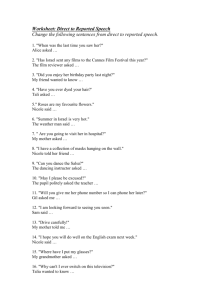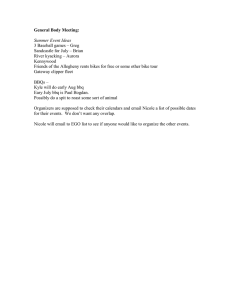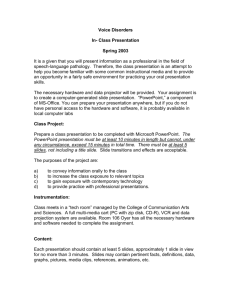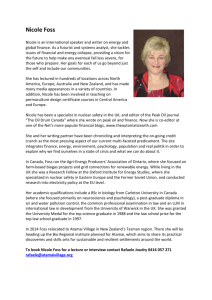Integration of PPS Competencies Written By: D. S. California State University, Fresno
advertisement
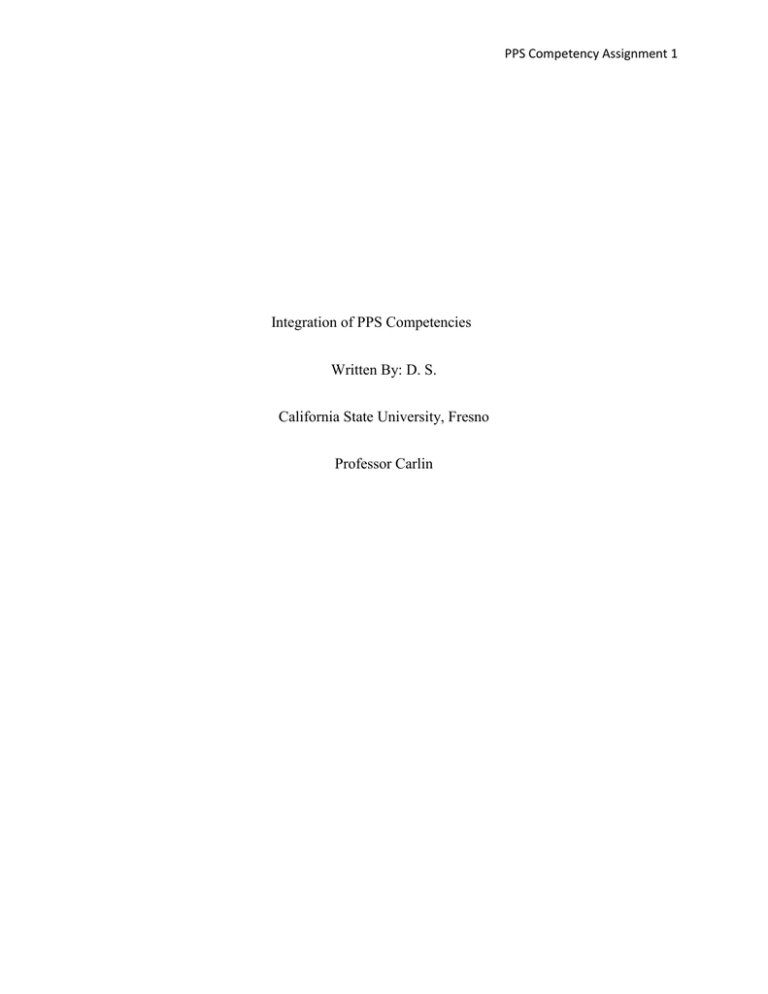
PPS Competency Assignment 1 Integration of PPS Competencies Written By: D. S. California State University, Fresno Professor Carlin PPS Competency Assignment 2 Case Summary *The name has been changed for confidentiality. Nicole is a 12 year old Hispanic female that attends Fort Miller Middle school and is in the eighth grade. Nicole was referred to me due to behavior and poor attendance. She had been sent to the office for fighting at the bus stop, and threatening other students. This was her third time in the office and we were only in the third week of school. Upon meeting with the student I reviewed her grades and attendance. In the fourth quarter of the 7th grade the student had a .05 GPA and had missed 48 days of school and 28 tardies. Nicole lives with her mother and older brother in south west Fresno. The student reports she had never met her father however stated she was very close to her grandparents and cousins. Nicole states they live across town and the student must take a bus to see them; she reports her mother does not get along with her grandparents and tries not to let Nicole go over there very often. Nicole also reported having a sister that is 20 that moved out at the age of 17 due to how their mother treated them and is currently living in LA. Nicole is not actively involved in school activities or in any community organizations including church. On two separate occasions we (I and Alex Gonzales) attempted to meet with this student’s mother to discuss grades, behavior and attendance, however both times she did not come to the scheduled appointments. Due to this we did a home visit while the student was at school and discussed with the parent the importance about education and the parent’s roles, responsibilities, laws and consequences. After meeting with the mother I met with the student and discussed the same topics. I was assigned this student as my first case at my internship and was to meet with the student bimonthly to monitor attendance, behavior and grades. PPS Competency Assignment 3 At a weekly meeting with this student, Nicole disclosed that her mother was abusing drugs and that the night prior to our meeting her uncle had been arrested from their home and a loaded fire arm which was found in the student’s closet by the police during a parole housing check; the student reports being unaware of the firearm in her closet. I discussed with student about a parents need to protect their children and at that time I felt a CPS report was needed; the student was aware of the report. CPS did a 10 day follow up however did not follow through with any services. I continued to meet with the student regarding grades and attendance for the next couple of months however student was not improving. At the time the student reported to me that the mother’s boyfriend had just gotten out of jail for domestic violence and was now living with them. The student reported that the boyfriend was using marijuana in the living room and when the student told him he could not do that he threw a pillow at her and when the mother went to pick up the pillow he kicked the mother. When the student went to call the police the mother did not allow her to call. At this time another CPS report was made and again student was aware of the report. I felt that discussing with the student about being responsible for her own actions and responsibilities for grades was not working because she continued to fail and miss school. The mother was also referred to SARB due to ongoing attendance issues. I decided to use a reward system; I saw that this student was not being praised in the home for her attempts and was not being supported by her mother in regards to education. I decided to only focus on the student’s strengths; I could see the student was not working at her full potential although struggling with ongoing family issues. PPS Competency Assignment 4 I discussed a plan with the student about a reward system. Together we made a progress report to send around to her teachers. The student was to make up missed assignments and increase her attendance from 74% to 95%. The student would be rewarded with either lunch or a gift card of her choice. Due to me leaving the semester early due to school we would resume meeting when school was back in session leaving the responsibility on the student while I was away. If she did not follow through with this plan she would then have to attend afterschool program 2 days a week to increase her grades. When we resumed meeting she had increase her grades from a 0.05 to a 2.0 however continued to miss school. The student and I decided that she could have until February 1st to increase attendance which in turn would increase her GPA. When we met on February third the student had increased her grades to a 2.5 and had increased her attendance to 95%. The student was rewarded with a Starbucks gift card. Developmental Theory As I mentioned Nicole is a 12 year old female, according to Piaget she is in the Formal Operations stage that consists of her ability to think abstractly including consequences of actions, making decisions and setting goals. Although Nicole needed someone to assist her with setting goals she was able to follow through with minimal assistance. As I met with Nicole more I saw her perspective on her mother’s style or lack of style in parenting and how it affected her. I could see how the student would challenging her mother for any type of attention; because I listened to Nicole and only focused on her positives I was able to build trust. Although Nicole showed normal adolescent behavior challenging her mother I believe that showing Nicole a new way of thinking and setting goals in regards to school was something that she could understand. Another thing that Nicole appeared to be lacking in her home life was social and emotional support. Yes her mother provided food, clothes and shelter however this student PPS Competency Assignment 5 appeared to be really struggling with her identity with limited support. When I first met with Nicole she had never opened up to an adult as she states no one ever listened to her and could never understand. Giving Nicole the chance to have someone listen helped her own personal fable in understanding her behavior and feelings. Nicole has increased her moral development in the 7 months that we have worked together tremendously. When I first met with Nicole she was wearing very revealing clothing trying to get anyone’s attention. Teaching Nicole to become aware of her appearance and how others may perceive her, and teaching her self respect was something that appeared new to the student. As I watched this student slowly change on the outside I saw her behavior change as well. She does not come to the office for fights or truancy because she has refocused how to get positive attention. Learning Theory At the time I did not know what theory I was using with this student, I know I focused on her strengths and sort of used areas of the solution focused approach however as I have learned I was using operant conditioning. According to Andrea Carlin (2012) applying learning theory and using the operant conditioning in understanding the factors that cause a behavior and developing a plan to change them and reinforcing the desired behavior. Some of the interventions that were used with this student were a contingency contract that appeared to have been successful. If the student did not increase her grades and improve her attendance she would have to participate in afterschool program to have someone monitor her while she made up work. The second was self monitoring; because I was not at the school during December she had to self monitor her behavior, attendance and increase her grades which inturn held her responsible for her own actions. PPS Competency Assignment 6 This student had never been held responsible for her behavior this contract helped shape the student’s identity and ability to succeed in school. The student was able to see if she increased her attendance she could understand the work; if she spoke to her teachers about her grades she learned that building rapport is important factor for success. Although many of these tasks are expected of children often times many students are not taught these skills. According to the article written by Minnard (2008) the greatest protective factors that can influence a youth are academic and social competence, caring and supportive adult-child relationship and supportive school climate. I also learned from my counseling 240 class according to Bob Nelson (2012) that one person that has an effect on a child whether it be positive or negative last three years. The last method that I used with Nicole was a token economy; the ability to earn rewards for positive change and losing those same rewards for not changing negative behaviors. Integration Competency 6 For this student it was important that I did a full multi dimensional assessment to really get to know the barriers that she faced. Getting to know the student before making the contingency contract was very important to know what motivated the student and gave her an increase chance to succeed. Also getting to know the parent helped me see what might inhibit this student’s ability to succeed from her home environment. The after school program was put in the contingency contract because if the student was not able to succeed on her then the program would have provided the structured help the student would need because most likely she would not have received the support at home. Competency 8 PPS Competency Assignment 7 This competency is similar to competency 6 for the home environment and the lack of support; however meeting the parent and seeing the home helped me see where the student lived and the lack of services within that student’s community. When I referred the student to outside counseling the student made it clear that the mother would not follow through with the referral because it was not on their part of town. This helped me identify the need for a functional family referral where the counselor actually goes out to the home for support. Competency 11 Getting to know each child is very important. According to Allen Meares (2010) evidenced based practice has been a defining controversy for school based social workers. The ability to know the theory we are using and how to use it effectively in the school setting can show the need for us to continue in the schools. Learning theories are very important when working with students to increase the social, emotional skills and responsibilities that can help shape them into productive citizens later in life. Nicole has helped me understand the importance of social workers in the schools. So many students are being passed along and the repercussions of that are evident in the percentage of dropouts after the 9th grade. Part of the NASW code of ethics states that we are competent in the services we provide including knowing and understanding the strategies and techniques we practice. PPS Competency Assignment 8 Reference Allen-Meares, P. (2010). Social work services in schools (6th ed.). Boston: Allyn & Bacon/Longman Carlin Andrea (2012) Power point Class One: Youth Development Minnard, C.V. (2002). A strong building: Foundation of protective factors in schools. Children & Schools, 24(4), p. 233-246.
